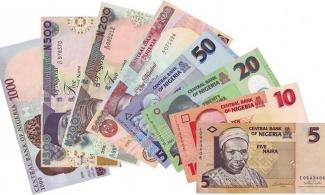
With foreign reserves of $32.8 billion, the lowest in a six-year, analysts predict further depreciation in 2024.
The outlook of Nigeria’s naira in 2024 is gloomy as the currency of the largest black country in the world is poised for its worst year since the return to democracy in 1999.
With foreign reserves of $32.8 billion, the lowest in a six-year, analysts predict further depreciation in 2024, Bloomberg reports.
The naira plunged 55% this year to 1,043 per dollar as of Thursday, making it the world’s worst performer after the Lebanese pound and the Argentine peso among 151 currencies tracked by Bloomberg, and that’s in the official market. On the streets, the currency trades at 1,208 naira per dollar.
Foreign reserves in Africa’s biggest crude producer are at the lowest in six years with most of them encumbered by overdue short-term overseas obligations. Unless President Bola Tinubu’s government lures international investors or ramps up oil output, the naira may slip further, according to Vetiva Capital Management Ltd.
In the non-deliverable forwards market, the naira’s 12-month contract is trading near a record low of 1,294.44 to the dollar.
“It’s clear that further devaluation — alongside tighter monetary policy — is needed to reduce imbalances in the FX market,” said Patrick Curran, a senior economist at Tellimer Ltd.
The depreciation began after the central bank allowed the currency to trade more freely in June, and Tinubu scrapped costly petrol subsidies. That — combined with the weakening naira — has fueled inflation, which is at 28.2%, while the benchmark interest rate is at 18.75%. The negative real interest rate has dissuaded overseas investors.
“A significant rise in external reserves, material increase in foreign exchange inflows, and reduction in money supply,” will be positive for the naira, Vetiva Capital said in a note to clients.